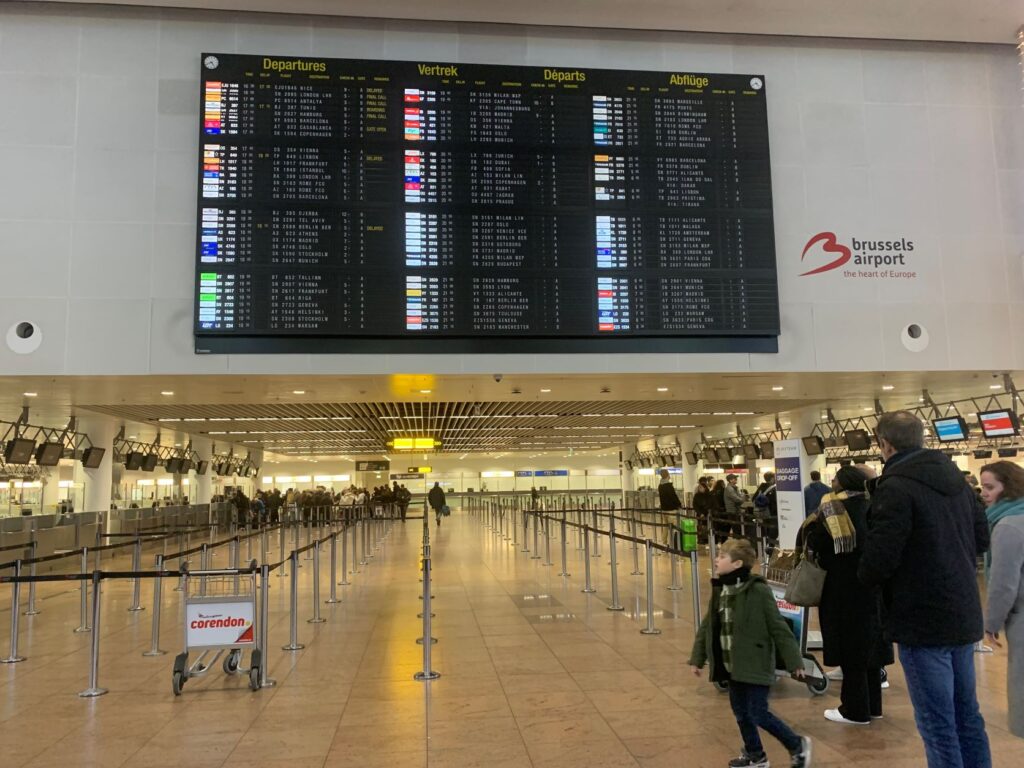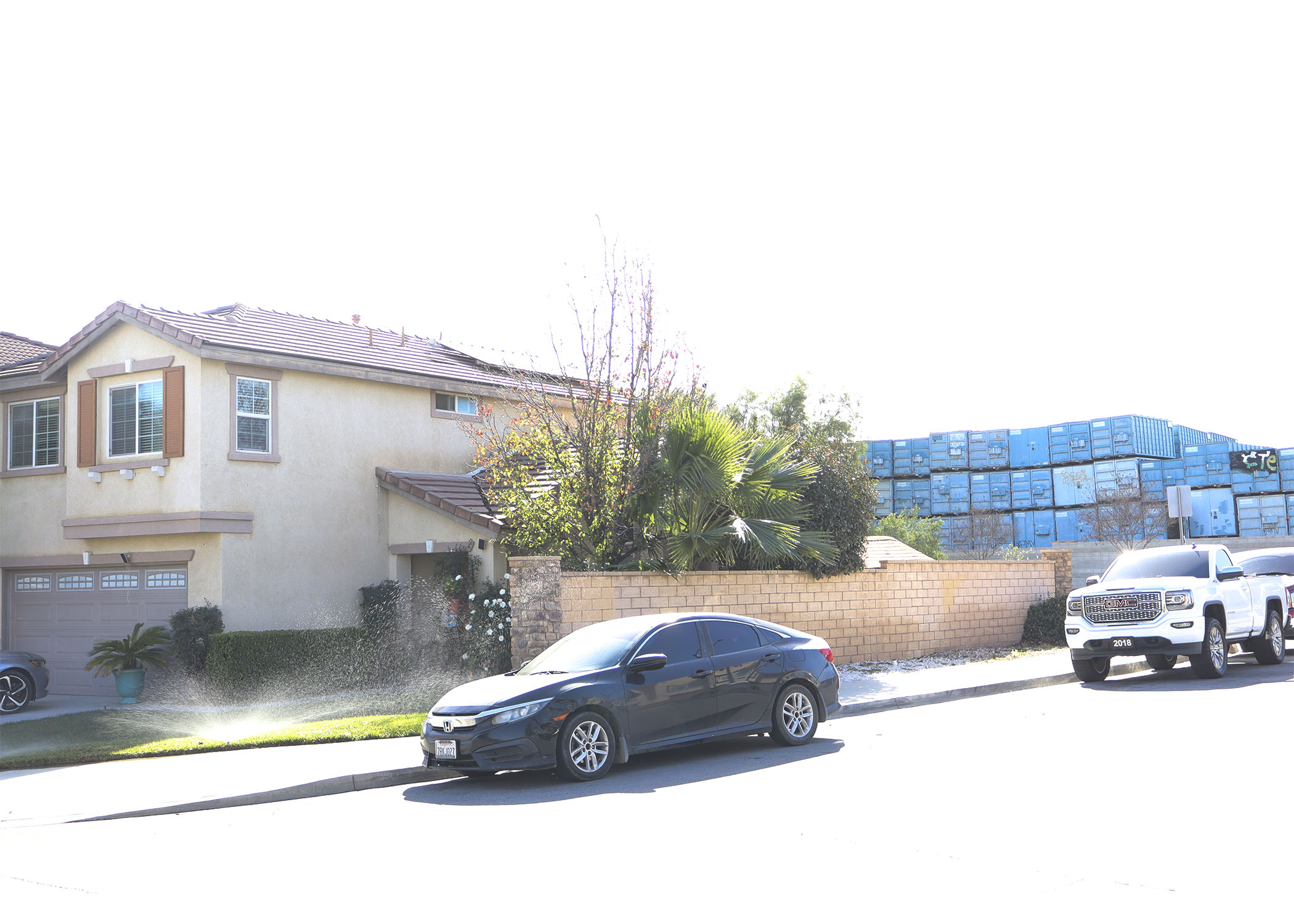(BRUSSELS) – In 2018, Maria Gkountouma decided to rent an apartment in the eastern part of Brussels. She didn’t know it at the time, but that apartment was directly underneath an active air route.
“At five in the morning, the airplanes would wake me up,” said Gkountouma. “Given that flights would stop at midnight and sometimes even later, this meant that I couldn’t get the 7-hour sleep I really needed.”
Brussels Airport is one of the busiest airports in Europe. It serves as a regional hub connecting Europe to NATO and the EU institutions based in the city. In 2019, the airport welcomed 26.3 million passengers, a record number. The airport expanded to become a hub for cargo flights this year. Proposed renovations promise to make way for future economic expansions.
The airport is located in the Flemish region of Belgium. The airport is surrounded by the residential Brussels’ neighborhoods of Woluwe-Saint-Lambert, Woluwe-Saint-Pierre, Evere and Schaerbeek. The noise from hundreds of daily flights has taken its toll on the communities that live there. In 1999, residents worked with advocates and the local government to successfully introduce the “Gosuin” decree. A measure that established zones and set limits on noise pollution from overhead flights at various times of the day. Instruments measuring aircraft noise were installed near the airport to ensure compliance with the decree.
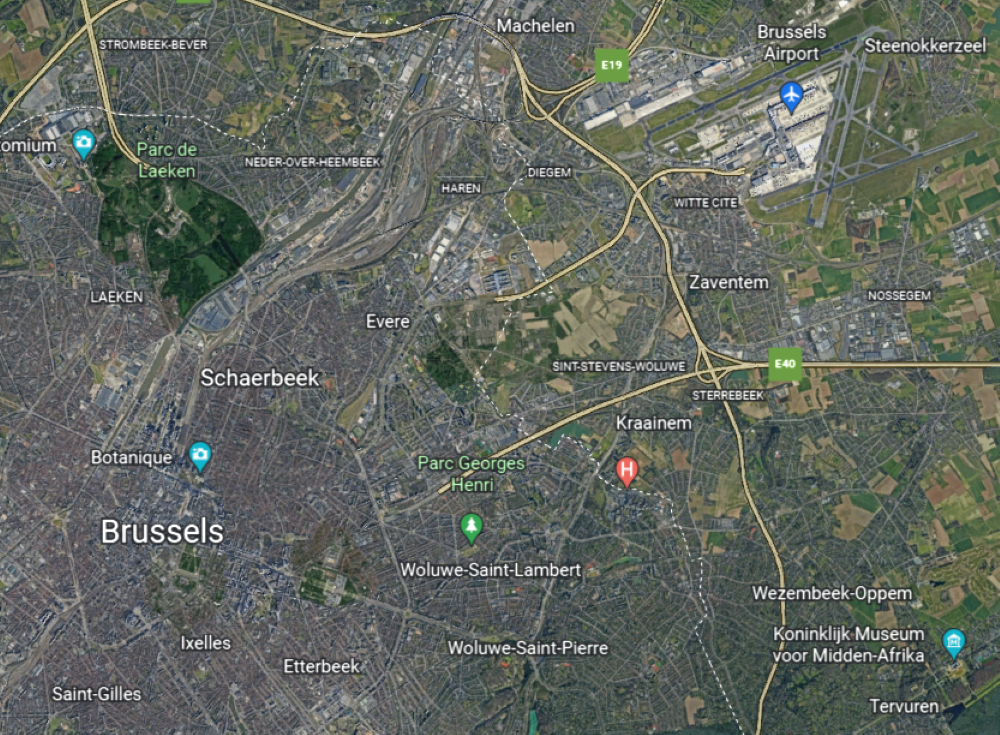
Brussels Airport is located less than 10 km away from Woluwe-Saint-Lambert. It is also surrounded by the densely populated Brussels’ communes of Woluwe-Saint-Pierre, Evere and Schaerbeek. [Courtesy of Google Earth, Dec. 2022]
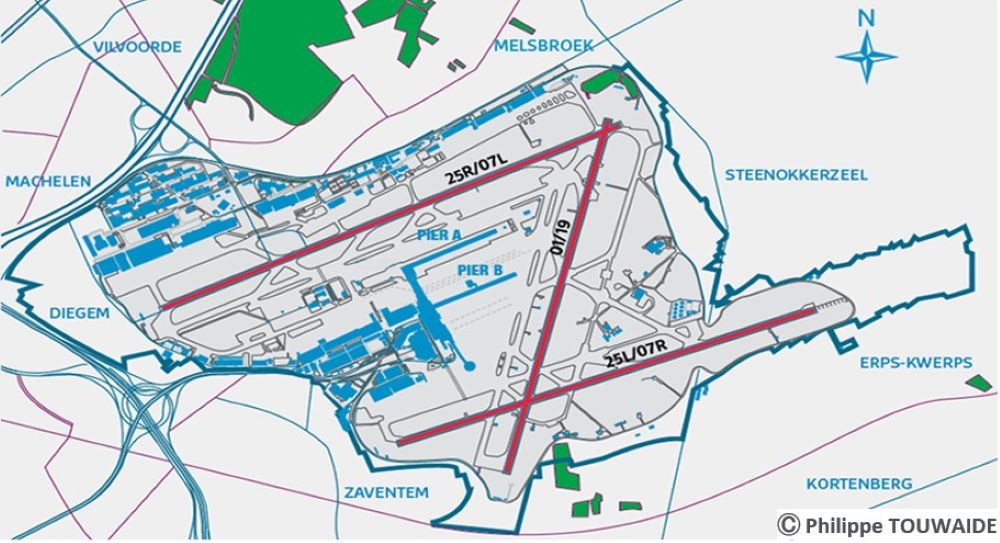
Overview of the Brussels Airport runways. In the new petition, Woluwe-Saint-Lambert’s council asks the Minister of Environment to reduce the use of runway 25L in order to ensure that densely populated areas in Brussels are not affected by plane takeoffs. [Courtesy of Philippe TOUWAIDE, Dec. 2022]
Roughly 58.5 thousand people live in Woluwe-Saint-Lambert and are impacted by what’s known as the “route du virage gauche” or “left turn route.” The flight path, frequently used for flights en route to South and Eastern Europe, is estimated to account for more than 50 percent of the flights departing from Brussels.
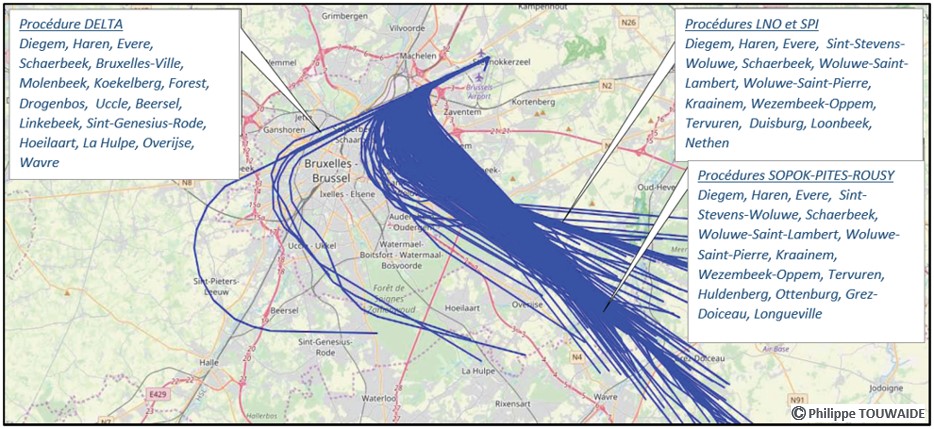
A chart showing the plane takeoffs from runway 25R using the “route du virage gauche”. Woluwe-Saint-Lambert is among the areas below the air pathway. [Courtesy of Philippe TOUWAIDE, Dec. 2022]
Woluwe-Saint-Lambert’s council launched the petition to pressure the airport’s governing authority to address the problem. The petition follows the publication of an environmental impact survey on noise pollution caused by Brussels airport. According to Matgen, the new petition came at the right time. “The issue has been going on for years and it’s time for a change.”
A Tale of Three Regions
Partisan politics has made finding a solution challenging. Belgium is a country divided into three regions, each representing different languages and cultural heritages. There is the Flemish region where residents speak Dutch, the Walloon region where residents speak French, and the Brussels-Capital region, which is bilingual. But the airport is governed by the federal government. That means that any changes to the flight routes must be agreed upon by the three separate regional governments, each with constituents who want peace and quiet.
In 2002, politicians agreed to authorize an air route for night flights. The proposed route would fly over less populated areas in the Flemish region. The affected citizens would benefit from a state program that would soundproof their homes. The route was initially approved, but following the launch, Flemish politicians complained that their constituents were suffering the noisy results. They demanded a new distribution of night flights between Brussels and the Flemish region. The government decided to abandon the new air route altogether, leading to tensions between the country’s prime minister, Guy Verhofstadt, and the government’s minister for transport, Isabelle Durant. The latter decided to resign two weeks before the 2003 federal elections. Following her departure, the government authorized an air route that would fly over Brussels.
“For those who wanted better regulations on aircraft noise, Durant’s resignation was a pity,” recalled Brigitte Buffard, president of Bruxelles Air Libre, a non-profit that advocates for better noise regulation. “She was from Brussels, knew very well what having airplanes flying over the city meant, and tried to do something about it.” Durant became involved in the file from the beginning of her mandate in 1999. Shortly after taking up her duties, she adopted a decree that would gradually ban night flights between one to five AM. But strong opposition from the airport’s management and DHL, who had expanded their presence in Brussels Airport, forced the minister to revoke her decision.
The federal government made further attempts to address noise pollution by introducing the “Anciaux” plan in 2003 and the “Wathelet” plan in 2014. Under those plans, the airport adopted air routes that diverted the flights to different areas. Both plans were poorly received though and Brussels’ citizens successfully blocked the Wathelet plan through the courts.
Sleepless Citizens
Until politicians can agree on flight paths that will evenly distribute noise pollution across Brussels, the citizens of Woluwe-Saint-Lambert continue to suffer.
Maria Gkountouma said that living in a house under an air route gave her anxiety. “It was impossible not to hear the noise. Every time an airplane would fly over the building, the walls would shake. If I was watching TV, I had to wait for the plane to leave to hear what was said. I stopped using an alarm clock because the noise would wake me up.”
Social media is filled with stories like Gkountouma’s. Their number one complaint is disrupted sleep. According to psychiatrist Agathi Valanidou a good night’s sleep is critical for coping with daily obligations. “A prolonged period of insomnia will lead to physical exhaustion and an inability to perform the same activities as before.” Over a prolonged period, lack of sleep can exasperate anxiety and mental health issues. “This creates a very stressful situation for people especially because they know that airplane noise is a factor they can’t influence.”
Sleep disturbance and stress aren’t the only health impacts of aircraft noise. In a report published in 2018, the World Health Organization suggested that exposure to noise can also cause cardiovascular disorders including hypertension, hearing impairments, and reduced cognitive performance among children.
Some of these effects can be easily mitigated, but others prove more challenging. According to a 2017 study published in the Noise and Health Journal, mindfulness programs can train residents to handle the stress caused by aircraft noise. But Dr. Valanidou says that prolonged sleep disturbance is complicated and addressing the root problem often requires medication.
The Solution is Up in the Air
A court in Brussels ordered an environmental impact study on the impact of the noise from the airport. The results were released in 2019.
The study recommended against diverting the flights to less populated areas. Instead, it suggested the establishment of a federal advisory body that will develop a coherent aircraft noise strategy and regulation that will be applicable across the country. The study also found that airport infrastructure, particularly runways, required improvement.
In addition, the report found that the Brussels Airport is not suitable for night flights and that management should reduce or ban them completely. Matgen and Buffard believe that banning these flights would dramatically improve the quality of life for affected residents. But they also acknowledged that adopting this measure would be challenging, given the popularity of night flights among low-cost airlines.
Matgen is confident that the study, along with the petition will work. “It will make the federal government understand that taking action is not only ordered by the courts but most importantly by the citizens.”
“I always sign the petitions on noise pollution and I encourage the members of our association to do so as well,” said Buffard. Still, she’s not convinced this one will work. “Over the years we signed countless petitions, we did demonstrations, and demanded the airlines to pay the penalties for violating the regulation in Brussels. But the problem is still here. It’s like a vicious cycle.”
She hopes that the climate crisis will incentivize the federal government to address the problem. “In the meantime, I fear that the longer it takes, the more people will decide to move.” Buffard says she already knows of people who have decided to leave because they couldn’t cope with the noise.
Gkountouma is one of them. Last month, she moved to the center of Brussels. Her quality of life improved instantly. “I can now wake-up at my own pace.” It’s not a perfect scenario. Her old apartment was within walking distance of shops and public transit. But her new neighborhood trades convenience for peace and quiet. For the first time in a long time Gkountouma can sleep through the night, and for that, she’s grateful. “I would never go back.”
